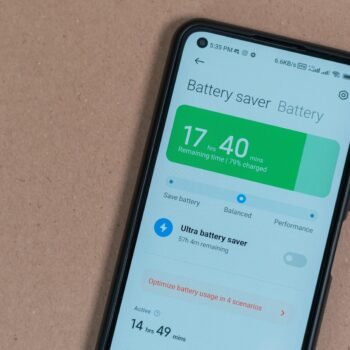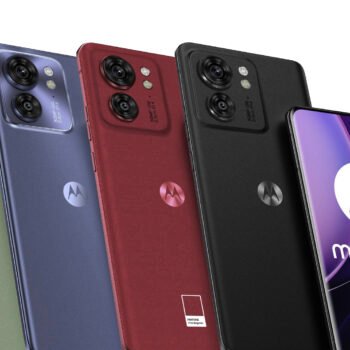Why Smartphone Security is Non-Negotiable in 2025
Your phone knows everything. Bank details, private conversations, location history, biometric data. It’s a digital vault containing your entire life. Yet most people treat smartphone security as an afterthought. Not anymore. 2025 has brought unprecedented cyber threats that make choosing one of the best secure smartphones absolutely essential for anyone who values privacy.
TL;DR: Best Secure Smartphones and Safety Recommendations
- 🛡️ Top 3 Phones: Purism Librem 6 dominates open-source security, Apple iPhone 16 Pro Max leads ecosystem protection, Google Pixel 9 Pro excels in AI-powered defense
- 🔗 Critical Security Trends: Post-quantum cryptography integration, hardware kill switches become standard, zero-trust architecture adoption
- 📝 Quick Recommendations: Journalists need Librem devices, executives benefit from Samsung Knox, activists should choose GrapheneOS options
The Rising Tide of Cyber Threats
Hackers have evolved. They’re not just after credit card numbers anymore. Modern cybercriminals target:
- Personal identity theft through SIM swapping
- Corporate espionage via compromised devices
- Government surveillance through backdoor access
- Cryptocurrency theft from mobile wallets
- Deepfake creation using stolen biometric data
Data breaches increased 68% in 2024 alone. Your regular smartphone? It’s like leaving your front door wide open.
How Modern Secure Phones Outsmart Hackers
Today’s best secure smartphones 2025 fight back with military-grade defenses:
- Hardware-level protection kicks in before boot. Secure boot verifies only trusted software runs.
- Dedicated hardware security modules act like isolated vaults for sensitive tasks.
- Software now offers real-time threat spotting, automatic patching, and default end-to-end encrypted messaging.
- Physical phone hardware kill switches (for camera/mic) are a key defense on leading devices.
- AI-powered defense predicts attacks. Machine learning instantly spots threats by analyzing behavior.
Top 10 Secure Smartphones of 2025: In-Depth Reviews
1. Purism Librem 6: Open-Source Champion
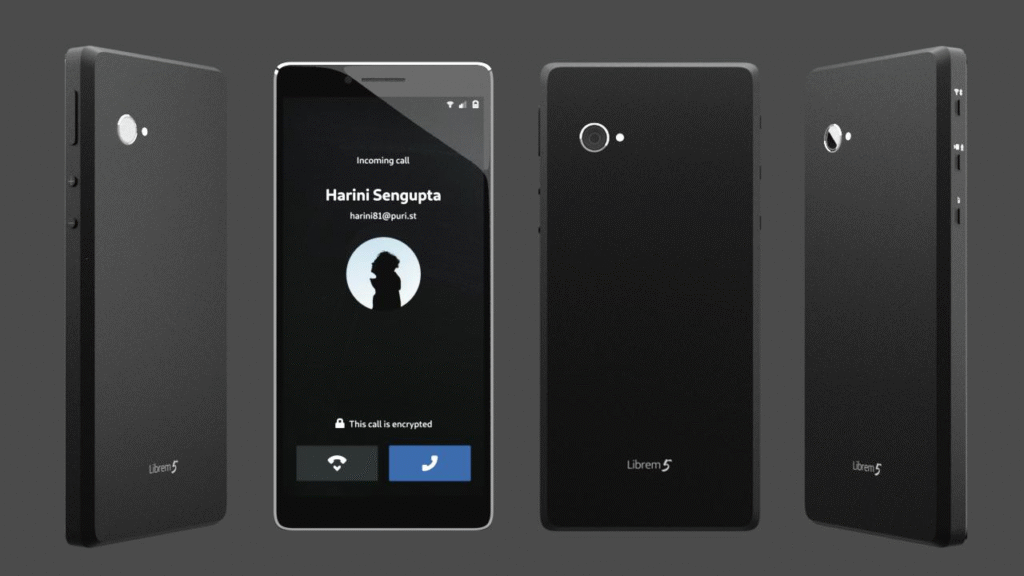
The Librem 6 represents everything open-source secure phones should be. Built from the ground up with privacy as the foundation, not an afterthought.
This device runs PureOS, a completely encrypted smartphones operating system that gives users total control. No hidden processes, no mysterious data collection, no backdoors.
Pros:
- Completely open-source hardware and software
- Physical kill switches for camera, microphone, Wi-Fi, and Bluetooth
- No Google services or tracking by default
- User-replaceable battery and modular design
- Lifetime software support commitment
Cons:
- Higher price point than mainstream alternatives
- Limited app ecosystem compared to Android/iOS
- Shorter battery life due to privacy-focused optimizations
- Learning curve for non-technical users
2. Apple iPhone 16 Pro Max: Ecosystem Fortress
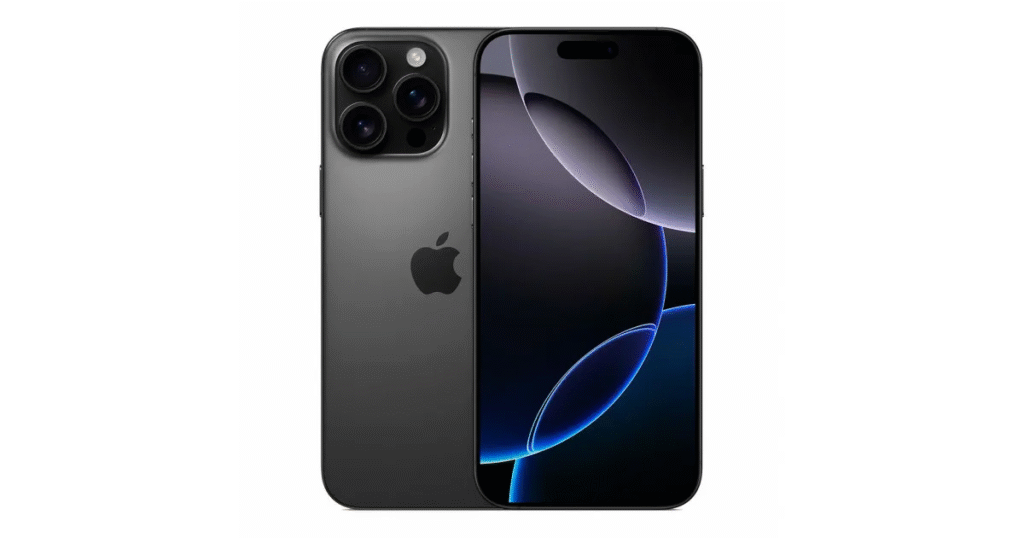
Apple’s latest flagship continues the company’s tradition of seamless security integration. The iPhone 16 Pro Max doesn’t just protect your device—it creates a fortress around your entire digital life.
Face ID now includes liveness detection that prevents photo and video spoofing. The new A19 Bionic chip processes everything locally, keeping your data away from cloud servers.
Pros:
- Seamless integration across Apple ecosystem
- Industry-leading biometric security with Face ID
- Regular, timely security updates for 7+ years
- Built-in encrypted messaging with iMessage
- Advanced anti-tracking features in Safari
Cons:
- Expensive entry point and ongoing ecosystem costs
- Limited customization options for power users
- Closed-source software prevents independent auditing
- Heavy reliance on Apple’s privacy policies
3. Google Pixel 9 Pro: AI-Powered Guardian

Google’s Pixel 9 Pro showcases how artificial intelligence can enhance smartphone security without compromising privacy. The device’s Titan M security chip works alongside AI to predict and prevent attacks.
Real-time malware detection happens on-device. No data leaves your phone for analysis. The result? Protection that adapts to new threats automatically.
Pros:
- AI-powered threat detection and prevention
- Fastest Android security updates directly from Google
- Advanced spam and phishing protection
- Secure folder for sensitive apps and data
- Call screening with spam detection
Cons:
- Google’s data collection policies remain concerning
- Battery drain from always-on AI security features
- Limited availability in some regions
- Expensive compared to other Android options
4. Samsung Galaxy S25 Ultra: Knox Matrix Mastery

Samsung’s Knox security platform reaches new heights with the Galaxy S25 Ultra. Knox Matrix creates a web of protection across all your Samsung devices, sharing threat intelligence in real-time.
The device features a dedicated security processor that handles encryption, authentication, and secure payments independently from the main system.
Pros:
- Industry-leading Knox security platform
- 7 years of security updates guaranteed
- Secure folder for work-life separation
- Advanced biometric options (fingerprint, face, iris)
- Enterprise-ready with comprehensive management tools
Cons:
- Bloatware and duplicate apps affect security surface
- Complex security settings can overwhelm users
- Higher price for maximum security features
- Samsung’s data collection practices lack transparency
5. Volla Phone X: GrapheneOS Innovator
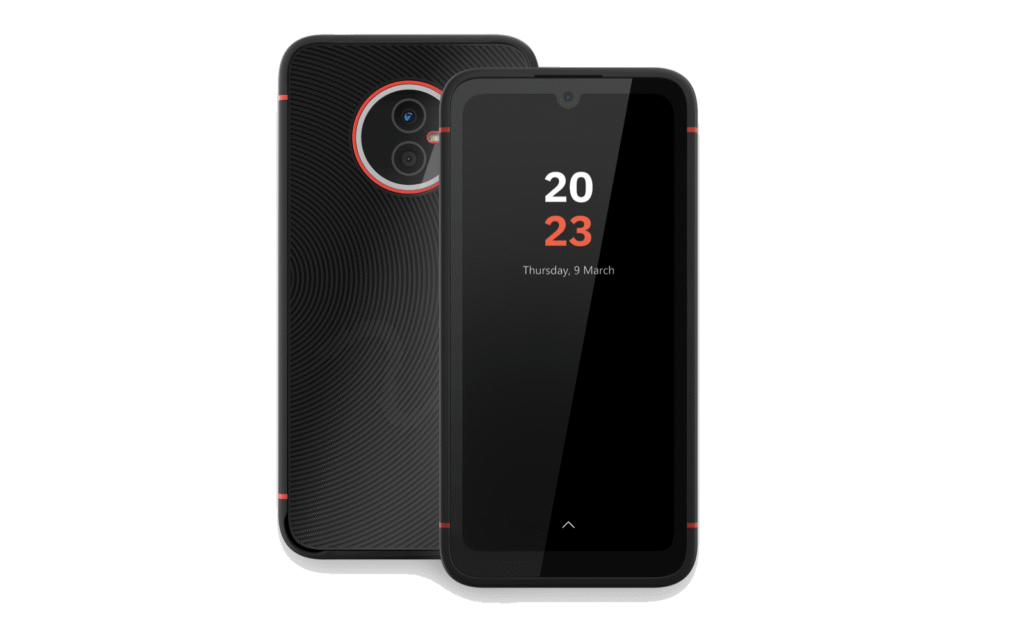
The Volla Phone X ships with GrapheneOS, widely considered the most secure Android distribution available. This secure smartphone comparison winner focuses purely on security without compromise.
GrapheneOS removes all Google services while maintaining app compatibility. Advanced exploit mitigations protect against zero-day attacks that would compromise other Android phones.
Pros:
- GrapheneOS provides maximum Android security
- Hardware-based attestation verifies system integrity
- Complete Google services removal
- Advanced memory protection and exploit mitigations
- Strong focus on user privacy and control
Cons:
- Steep learning curve for average users
- Limited app compatibility without Google Play Services
- Smaller community support compared to mainstream options
- Regular manual updates required for maximum security
6. Fairphone 6: Ethical Hardening

The Fairphone 6 combines ethical manufacturing with serious security features. This modular device supports multiple operating systems, including security-focused Linux distributions.
User-replaceable components mean you’re not forced to upgrade when security support ends. Simply swap in new modules to extend your phone’s secure lifespan.
Pros:
- Modular design extends device lifespan
- Multiple OS options including Linux distributions
- Ethical sourcing and fair labor practices
- 8+ years of software support planned
- User-repairable design reduces security risks
Cons:
- Bulky design compared to mainstream phones
- Higher price for mid-range performance
- Limited availability in some regions
- Smaller developer community for custom ROMs
7. BlackBerry Evolve: E2E Encryption Elite

BlackBerry returns to smartphones with the Evolve, featuring enterprise-grade security from the ground up. Every communication is encrypted end-to-end by default, with no exceptions.
The device includes BlackBerry’s legendary keyboard alongside modern touchscreen functionality. DTEK security monitoring provides real-time privacy assessments.
Pros:
- Industry-leading end-to-end encryption
- Enterprise-focused security features
- Physical keyboard for secure typing
- Real-time privacy monitoring with DTEK
- Strong government and corporate adoption
Cons:
- Limited consumer app ecosystem
- Higher learning curve for casual users
- Premium pricing for business features
- Smaller screen due to physical keyboard
8. Librem 5 USA: Military-Grade Privacy
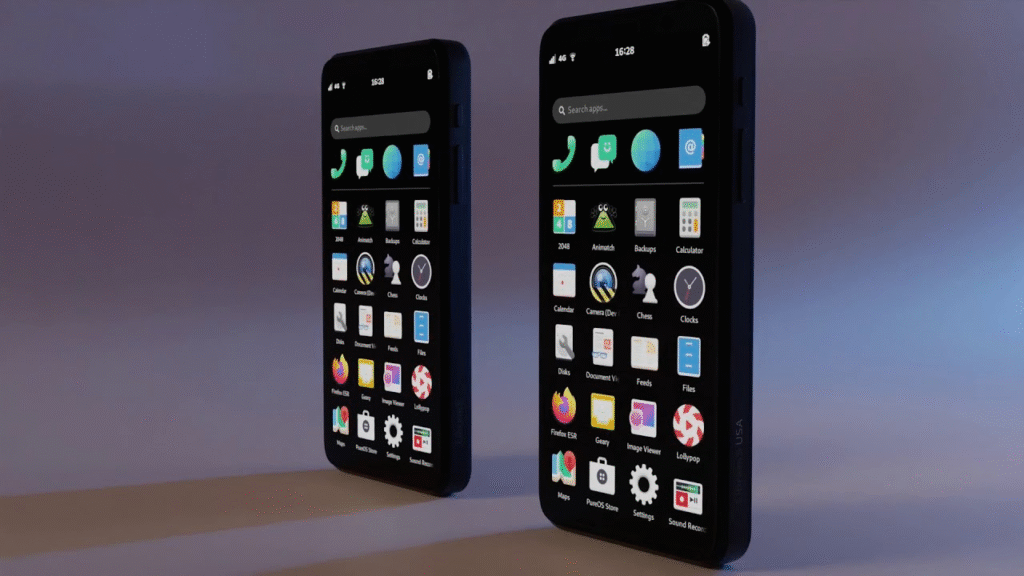
Assembled entirely in the United States, the Librem 5 USA meets strict supply chain security requirements. This device targets users who need absolute certainty about their phone’s origins.
Hardware kill switches physically disconnect cameras, microphones, and radios. No software can override these switches—they’re hardwired for maximum security.
Pros:
- Assembled in the USA with verified supply chain
- Hardware kill switches for all sensors
- Completely open-source hardware and software
- No proprietary firmware or drivers
- Lifetime software support included
Cons:
- Very high price point
- Limited performance compared to mainstream phones
- Smaller app selection
- Requires technical knowledge for optimal use
9. PinePhone Pro: Linux Customization King

The PinePhone Pro caters to Linux enthusiasts who want complete control over their mobile security. Multiple operating systems are available, from Ubuntu Touch to postmarketOS.
Developer-friendly design allows custom security implementations. Want to run your own VPN server on your phone? The PinePhone Pro makes it possible.
Pros:
- Multiple Linux distributions supported
- Complete hardware documentation available
- Developer-friendly with GPIO pins exposed
- Very affordable for a secure smartphone
- Active open-source community support
Cons:
- Requires significant technical expertise
- Battery life shorter than commercial phones
- Limited multimedia capabilities
- No official app store or support
Head-to-Head Comparison
Security Features Scorecard
| Device | Encryption | Biometrics | Update Lifespan | Hardware Security |
| Librem 6 | ★★★★★ | ★★★☆☆ | Lifetime | ★★★★★ |
| iPhone 16 Pro Max | ★★★★★ | ★★★★★ | 7+ years | ★★★★★ |
| Pixel 9 Pro | ★★★★☆ | ★★★★☆ | 7 years | ★★★★☆ |
| Galaxy S25 Ultra | ★★★★☆ | ★★★★★ | 7 years | ★★★★☆ |
| Volla Phone X | ★★★★★ | ★★★☆☆ | 5 years | ★★★★☆ |
Price vs. Protection: Budget to Premium Analysis
Budget Security ($400-600):
- Teracube V offers the best value for basic security needs
- Fairphone 6+ provides modular upgradability
- PinePhone Pro serves Linux enthusiasts on a budget
Mid-Range Protection ($600-900):
- Volla Phone X delivers GrapheneOS security
- Pixel 9 Pro balances features with security
- BlackBerry Evolve targets business users
Premium Security ($900+):
- iPhone 16 Pro Max leads ecosystem integration
- Galaxy S25 Ultra maximizes Android security
- Librem devices offer ultimate privacy at premium prices
Best for Specific Needs: Journalists, Executives, Activists
Journalists need devices that protect sources and resist surveillance:
- Librem 6 with hardware kill switches
- PinePhone Pro with custom security implementations
- Volla Phone X running GrapheneOS
Executives require seamless security that doesn’t interrupt business:
- iPhone 16 Pro Max for ecosystem integration
- Galaxy S25 Ultra with Knox management
- BlackBerry Evolve for secure communications
Activists must assume they’re targeted by sophisticated adversaries:
- Librem 5 USA with verified supply chain
- Fairphone 6+ with multiple OS options
- Any device running GrapheneOS or similar hardened systems
FAQ: Your Top Security Questions Answered
What makes a phone “secure” vs. regular in 2025?
Secure phones differ from regular devices in several key areas. They feature dedicated security processors that handle encryption independently. Hardware security modules create isolated environments for sensitive operations. Regular phones often lack these specialized components.
Software-wise, secure phones run hardened operating systems with minimal attack surfaces. They receive priority security updates and often include built-in privacy tools. Regular phones typically prioritize convenience over security.
Can governments bypass modern device encryption?
Modern encrypted smartphones use advanced cryptographic methods that are mathematically difficult to break. However, governments have other options:
- Legal pressure on manufacturers for backdoors
- Exploiting software vulnerabilities before patches
- Physical device attacks on compromised hardware
- Social engineering to obtain passwords or biometrics
Post-quantum cryptography phones are preparing for future threats from quantum computers that could break current encryption methods.
Are biometrics (facial/retina) safer than passwords?
Fingerprint or face unlock feels effortless, sure, but it’s not without risks. Once someone gets your unique biometric data, you’re stuck with it – unlike a password you can easily change. Another big difference? In lots of areas, authorities can legally require you to unlock your device using your face or finger; demanding a password is a different story entirely. The smart move? Combine both methods. Enjoy the speed of biometrics for everyday unlocking, but always have a robust password ready as your reliable fallback.
How Vital Are Security Updates For Smartphones?
Don’t delay installing security patches. Waiting leaves devices wide open to serious threats, including brand-new attacks that can strike mere hours after they’re found. Getting updates monthly is the bare minimum; weekly or daily patches offer far better defense. Gadgets that no longer receive patches become a growing bullseye. That’s why ongoing updates from the OS maker are vital for lasting security.
Is a VPN enough, or do I need a secure phone?
Keep in mind that an encrypted tunnel only guards your internet connection. It won’t shield your device from harmful software, stop applications gathering your personal information, or prevent physical access if your phone is lost. Think of this tool as a single component in your overall safety plan. Hardened devices deliver protection directly on the gadget itself, something a tunnel service can’t achieve. Blending both approaches gives you the strongest shield.
Do secure phones work with mainstream apps (WhatsApp, Banking)?
Most secure phones support mainstream apps, but with important caveats:
- Open-source secure phones may require alternative app stores
- Banking apps might not work on rooted or modified devices
- Some apps refuse to run on devices they consider “insecure”
- Functionality may be limited without Google Play Services
Always verify app compatibility before purchasing a secure phone for business use.
What’s the average lifespan of a secure smartphone?
Security-focused phones typically receive updates longer than mainstream devices:
- Premium secure phones: 5-7 years of updates
- Open-source secure phones: Often lifetime support
- Mainstream flagships: 3-5 years typical
- Budget devices: 2-3 years maximum
Factor update lifespan into your total cost of ownership calculations.
Will quantum computing break current phone encryption?
Quantum computers pose a theoretical future threat to current encryption methods. However:
- Practical quantum computers capable of breaking phone encryption don’t exist yet
- Post-quantum cryptography phones are already being developed
- Migration to quantum-resistant algorithms is underway
- Timeline for quantum threat is estimated at 10-15 years minimum
Current secure phones remain safe for their expected lifespans, but future-proofing is important for long-term security planning.



